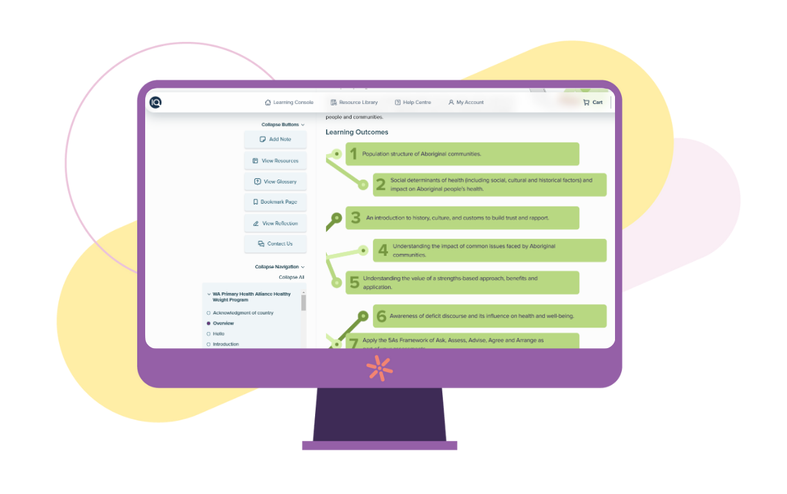Supporting Aboriginal patients living with overweight and obesity through culturally safe care
Online training for health professionals
New online training, equips health care professionals with the skills and knowledge to create a supportive and culturally safe environment for Aboriginal people to discuss weight-related health concerns.
For Aboriginal people, good health is more than just physical, with a strong focus on holistic wellbeing including the social, emotional, cultural and spiritual wellbeing of the individual and whole community – as well as connection to Country. Through this training, health care professionals will gain skills to address unconscious bias, overcome barriers to care, and build stronger relationships with Aboriginal communities.
These modules are approved by the Royal Australian College of General Practitioners for 8.5 hours of educational activities and 2 hours of performance review.

The Aboriginal Weight Management eLearning modules include:
- Population structure of Aboriginal and Torres Strait Islander communities.
- Social determinants of health.
- Being a culturally safe clinician.
- Health care frameworks and models.
- Healthy weight conversations.
- Resources for health care professionals.
Other learning and education resources you may find useful
Yarning with Aboriginal patients
Video resources Yarning about weight: Building trust through social yarning and Yarning about weight: Setting goals and supporting change through management yarning offer practical techniques to create a more supportive and culturally safe environment for Aboriginal people to discuss their weight-related health concerns.
Conversations About Weight – Online weight management training
Learn how to support people living with overweight and obesity with these six one-hour modules that focus on different aspects of weight management, including causes and treatments, from both a patient and health professional perspective.
Disclaimer
Online Education Materials are intended for general information purposes only and may contain sensitive images and content that may be upsetting or disturbing, user discretion is advised. The material is not designed to be, and is not a substitute for, formal clinical guidelines, educational texts, or individualised professional, medical or related advice or opinion, and should not be taken as such.
The Online Education Materials does include the views or recommendations of third parties and does not necessarily reflect the views of WAPHA or a commitment to a particular course of action. Further, the Online Education Materials may contain sensitive images and content, which are used with all necessary consents and for medical educational purposes only. The Online Education Materials (in any form) should not be copied, transmitted, distributed, reproduced, or used for any other purpose, including any purpose contrary to law.
Although WAPHA makes all reasonable efforts to provide quality and accurate information in the Online Education Materials, to the extent permitted by law, WAPHA does not provide any guarantee or warranty that that information is complete, accurate, reliable, or suitable for all purposes. The information within the Online Education Materials is based on clinical evidence at the time of its publication. Any reliance you place on such material is therefore strictly at your own risk.
The links to third party websites in the Online Education Materials are provided for your information only and should not be interpreted as an endorsement by us of those websites or their information. If you choose to visit, or use, a third-party website and/or its information you do so at your own risk and subject to the terms and conditions of use of that website.
